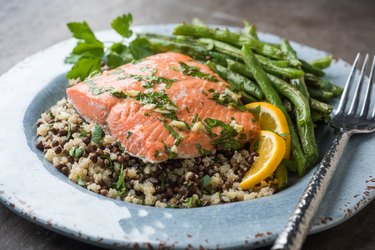
Fat has gotten a bad rap. The truth is, though, that the right kind of dietary fat in the right amounts is not only healthy but essential for your body. But exactly how many grams of fat should you be eating each day?
"Healthy fats are important for many bodily functions, including cell integrity and heart, brain and hormone health as well as for the absorption of certain nutrients and vitamins," says Cindy Klinger, RDN, LDN, an Integrative Dietitian at Cambiati Wellness in Lafayette, California.
Video of the Day
Video of the Day
So it's crucial to know which type of fat you're consuming and the effect (good or bad) it has on your body, and to have an idea of how much you should consume daily.
Total Fat Recommendation
For healthy adults, dietary fat should account for 20 to 35 percent of your total calories, as recommended in the 2015-2020 Dietary Guidelines for Americans. So the exact gram requirement for you ultimately depends on the average number of calories in your diet.
For example, if you adhere to a 2,000-calorie-per-day diet, you should get about 400 to 700 of those calories from fat every day. Keep in mind that all fat has nine calories per gram, meaning that if you divide those calories by nine, you'll get your recommendation of 44 to 78 grams of fat per day.
You can use the same calculation based on your specific daily calorie needs, but below is a table with a few examples of common calorie needs and related fat gram recommendations to give you a better idea.
Recommended Grams of Fat Per Day Based on Calorie Intake
Total Calorie Intake | Recommended Calories From Fat | Recommended Grams of Fat |
1,200 | 240 - 420 | 27 - 47 |
1,500 | 300 - 525 | 33 - 58 |
1,800 | 360 - 630 | 40 - 70 |
2,000 | 400 - 700 | 44 - 78 |
2,200 | 440 - 770 | 49 - 86 |
Get More Good Fats

The total fat gram recommendation includes all fats in your diet, whether they are beneficial or not. But ideally, virtually all of the fat you consume should come from polyunsaturated and monounsaturated sources, otherwise known as PUFAs and MUFAs.
These fats — which are found in cold-water fish, olive oil, nuts, seeds (including flax and chia) and avocados — can help lower your overall cholesterol level, and thus protect your heart, especially when you consume them in place of saturated fats.
Tip
When buying fish, it is best to choose wild-caught. "Generally, wild mackerel, cod, salmon, sardines and trout can be great options," says Klinger.
Limit Saturated Fats

You don't need to avoid all saturated fats completely, forever, but you should strive to minimize them in your diet as much as possible. This harmful fat can contribute to the hardening of your arteries, as well as a high total cholesterol level. Over time, a diet high in saturated fats can elevate your risk of heart disease and stroke, per the American Heart Association (AHA).
Foods high in saturated fats are mostly animal-based products, including eggs, whole milk, butter and processed meats like bacon and sausage as well as red meat like beef, pork and lamb.
The 2010-2015 Dietary Guidelines for Americans allow for a maximum of 10 percent of your total calories to come from saturated fat. However, if you need to lower your cholesterol, the AHA sets a limit of 5 to 6 percent. For a 2,000-calorie diet, this amounts to a maximum of 22 grams of saturated fat if you're healthy, or just 11 to 13 grams if you're already at risk for heart disease.
The bottom line? When it comes to fat in our diets, the focus should be on which ones, not only how much.
Was this article helpful?
150 Characters Max
0/150
Thank you for sharing!
Thank you for your feedback!